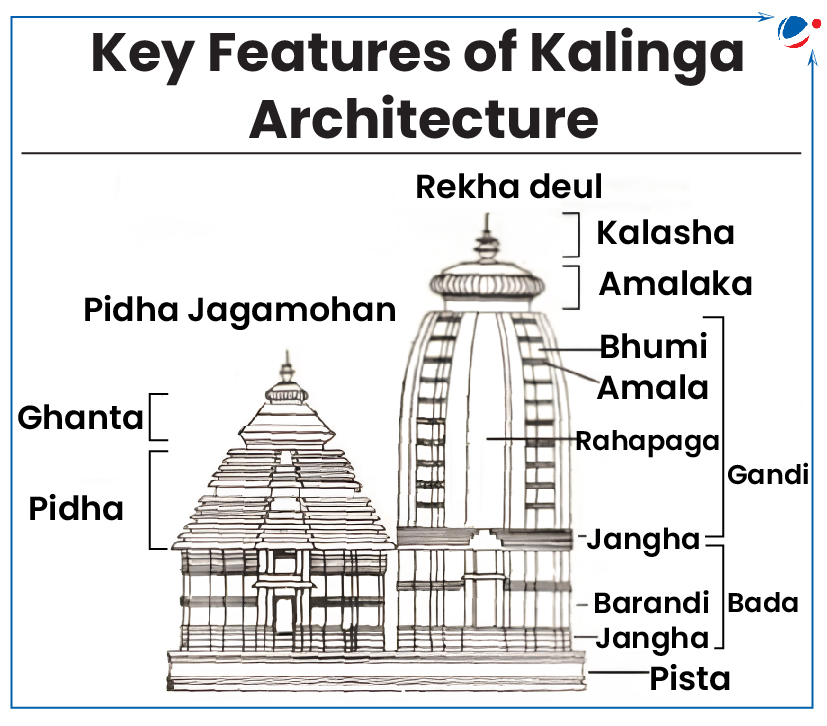Shree Jagannath Temple
Ratna Bhandar, the sacred treasury of Shree Jagannath Temple, Puri reopened after 46 years.
- Odisha government established high level committee led by retired Justice Biswanath Rath to supervise inventorisation of valuables including jewellery stored in Ratna Bhandar.
- Additionally, Magji Ladoo (Odisha's Dhenkanal district), one of the ‘chappan bhog’ prasad at Shree Jagannath Temple got Geographical Indication (GI) Tag.
About Ratna Bhandar
- Located on northern side of Jagamohana (assembly hall of temple).
- Comprises of Bahar Bhandar (outer chamber) and Bhitar Bhandar (inner chamber).
- These chambers contain jewels of three sibling deities — Lord Balabhadra, Lord Jagannath, and Devi Subhadra.
Shree Jagannath Temple, Puri, Odisha (White Pagoda)

- Dedicated to Lord Jagannath (incarnation of Lord Vishnu), Sister Devi Subhadra and elder brother Lord Balabhadra (holy trinity).
- Built during rule of Anantavarman Chodaganga Deva, the founder of Ganga dynasty in first part of 12th century A.D.
Architectural style of Shree Jagannath Temple
- Architecture style: Kalinga Architecture
- Four component parts consisting of
- Vimana or Deula (Garbhagriha): Built in style of nagara type Rekha deula characterized by curvilinear tower known as sikhar.
- Jagamohana: It is in form of Pidha deula, in which sikhara has tiers of diminishing pidhas or platforms.
- Natamandapa: Audience/Dancing Hall
- Bhogamandapa: Hall for residuary offerings.
- On both sides of outer wall of main temple, figures of Vishnu, four on either side are carved which altogether depict 24 forms of Vishnus, like Keshava, Madhava, Damodara and Narayana etc.
- Tags :
- Puri Jagannath Temple
- Shree Jagannath Temple
- Kalinga Architecture
World's Oldest Cave Painting
Scientists have discovered the world’s oldest-known cave painting inside Leang Karampuang cave in Sulawesi, Indonesia, dating back at least 51,200 years.
- Previously, the oldest known painting was in Sulawesi’s Leang Tedongnge cave, dating to at least 45,500 years ago.
- However, some believe that the painting in Spain’s Maltravieso cave attributed to Neanderthals is the oldest and dates back to around 64,000 years ago.
About Karampuang cave painting
- Its age was determined using uranium-based dating technology.
- Features a standing pig and three smaller human-like figures in dark red pigment.
- Tags :
- Cave Painting
- Karampuang cave painting
Apatani Tribe
Researchers from the Zoological Survey of India (ZSI) have recorded a new species of forest-dwelling horned frog from the Talle Wildlife Sanctuary (Arunachal Pradesh).
- New species has been named after the dominant Apatani community in Arunachal Pradesh.
About Apatani Tribe
- The tribe Found in Ziro valley and known for their effective traditional village council called bulyañ.
- Region of tribe has been included in UNESCO’s Tentative List as living Cultural Landscape (where man and environment have harmoniously existed together in a state of interdependence).
- Major Festival: Dree and Myok
- Key Dance: Daminda, and Pree dance
- Tags :
- Arunachal Pradesh
- Apatani Tribe
- Ziro Valley
Mascho Piro (Mysterious Tribe)
Recently, uncontacted indigenous Mashco Piro tribe was located in remote Peruvian Amazon, in Peru.
About Mascho Piro
- Numbering more than 750, they are believed to be largest uncontacted tribes living in jungles of Amazon and Southeast Asia.
- They are nomadic hunter-gatherers.
- Contact with them is prohibited fearing the spread of a disease among population to which it has no immunity.
- Madre de Dios Territorial Reserve was notified in 2002 to protect their territory. However, large parts of land have been sold to companies for timber and other produce.
- Tags :
- Mascho Piro
- Tribe
- Peru
Indian Newspaper Society (INS)
Prime Minister inaugurates INS Towers in Mumbai.
About INS
- Genesis: Its origin can be traced back to 1927. INS is established as Indian & Eastern Newspaper Society (IENS) in 1939.
- Mr. Arthur Moore of the Statesman was the first president of INS.
- Key objective: To act as a central organization of the Press of India and of any other country in Asia, which desires to associate itself with the Society.
- Members: Owners, proprietors and publishers of print media
- Key role:
- An independent body authenticating circulation figures of newspapers and periodicals in India.
- Protecting and promoting the freedom of press in India.
- Tags :
- Indian Newspaper Society (INS)



